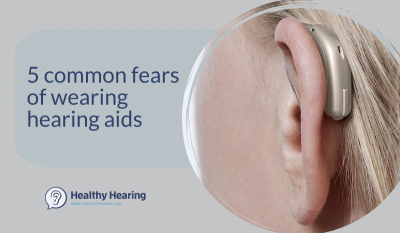There is no question that our culture worships at the altar of youth and vitality. So is it any wonder that people with hearing loss are hesitant to admit it, let alone get hearing aids, for fear of appearing old?
Besides cost, a persistent negative stigma about hearing aids keep many people from getting the help they need, research shows.
Hearing aid and hearing loss stigma
What the research shows

you engaged in the world.
Research indicates hearing aid and hearing loss stigma is a real thing. A study published by Margaret Wallhagen, Ph.D., found that hearing loss stigma is strongly associated with “feelings of altered self-perception." Some examples she cites are the perception of being “abled” versus disabled, and smart versus cognitively impaired. Among the people in study, these perceptions were enough to cause a delay in seeking treatment for hearing loss.
The study by Wallhagen breaks down the stigma even further, dividing it into three specific parts: alteration in self-perception, as mentioned above, along with ageism and vanity. Vanity most certainly comes in to play when it comes to seniors not wanting to “look” old.
'Too embarrassed to wear' hearing aids
This a problem across Western cultures. "The general population perceives individuals with hearing loss as being 'old,' 'cognitively diminished,' poor communication partners,' and generally 'uninteresting,'" note the authors of a paper on the topic, published in The Hearing Review.
When asked why they don't wear hearing aids, people with hearing loss cite a slew of stigmatizing reasons, survey data shows, such as "too embarrassed to wear," "makes you look disabled," and "people make fun of you."
Harmful to mind and body
This comes at a high cost. People hide their hearing loss, and start avoiding situations where they may struggle to communicate. This is bad for mental and physical health.
Overcoming the fear of hearing aids
Nothing ages a person more than continually asking people to repeat themselves, answering questions inappropriately and being disconnected from the world around you.
Studies indicate most people wait seven to 10 years before doing something about their hearing loss. In addition to the stigma, people cite these reasons:

'I’m afraid they’ll make me look old.'
This is a common concern for some people. But in reality, untreated hearing loss can make you appear older, especially if you:
- Ask people to repeat themselves continuously because you didn’t hear them the first time,
- Turn up the volume so high on the television, no one wants to watch it with you anymore,
- Respond inappropriately because you didn’t hear the conversation clearly.
If you’re really self-conscious about the way hearing aids look, ask a hearing healthcare professional if your hearing loss can be treated with a hearing aid style that fits completely in your ear canal, or looks like it’s just a Bluetooth earpiece. Whether it’s a set of earbuds or a hearing aid, as long as it helps you hear better, you’ll not only appear younger, you’ll feel better, too.
'I don’t like to go to the doctor.'
If fear of seeing the doctor is related to a fear of not knowing what will happen at your appointment, let us enlighten you. Although every hearing healthcare professional has their own procedure, here’s a general idea of what you can expect at your first hearing evaluation:
- The hearing healthcare professional or a member of her staff will ask you a series of questions relating to your overall health.
- Your ear canals and eardrums will be painlessly examined with a special light called an otoscope.
- The levels of hearing in each ear will be measured in a sound-treated test booth.
- Once testing is complete, the hearing healthcare professional will discuss the results with you and provide further recommendations and treatment options as needed.
And, please don’t let the cost of the evaluation keep you away, either. Most hearing evaluations cost between $150 and $225 depending upon the tests conducted as well as the age of the patient. Many insurance plans cover this cost (check with your provider) and many hearing centers can help qualified patients find financial assistance.
'I won’t be able to afford them.'
While this is a reasonable fear, it shouldn’t prevent you from seeking treatment for hearing loss. Instead, do a little research. One of these options may be the financial answer you’re looking for:
- Monthly payments. Many hearing health centers offer a payment plan. Some even offer refurbished hearing aids at a discount or have a relationship with a foundation which helps their patients cover some or all costs associated with their hearing health.
- Veteran’s Administration hearing benefits. Are you a veteran? If so, check with your VA. Chances are your hearing health is covered.
- If you can't work becuase of a job-related hearing loss, you may be entitled to Social Security benefits or workers' comp coverage.
- Vocational Rehabilitation. If you are a prospective or current college student or are still employed, you may qualify for hearing aids through your state’s vocational rehabilitation program.
- Social service organizations such as Kiwanis, Optimist and Lion’s Clubs often sponsor programs within their communities.
'They won’t work.'
In the last 10 years, hearing device technology has improved significantly. Today’s hearing devices are better able to distinguish speech from background noise, are smaller and more discreet and are designed to work in tandem with all of your favorite technology (think smartphone, television and computer).
'I’ll lose them.'
Used correctly, hearing aids will most likely be one of the first things you put on in the morning and the last things you take off at night. Make them part of your morning and bedtime routines, and you’ll be able to eliminate this fear easily.
If you’re still not confident you can keep track of them, talk to your insurance agent about adding hearing aids to your personal property insurance, and keep in mind that your hearing aid's smartphone app will likely include a hearing aid tracker. Also, all hearing aids come with a basic warranty, and you can buy extended hearing aid warranties, too.
Where to get help
If you have hearing loss and aren't sure where to start with treatment, find a hearing care specialist near you. If and when you need hearing aids, your provider will guide you every step of the way.
The above is the interpretation of Overcoming the Stigma of Hearing Loss and Hearing Aids provided by Chinese hearing aid supplier Shenrui Medical. Link https://www.srmcm.com/Blog/Overcoming_the_Stigma_of_Hearing_Loss_and_Hearing_Aids.html of this article is welcome to share and forward. For more hearing aid related information, please visit Blog or take a look at our Hearing aids products















